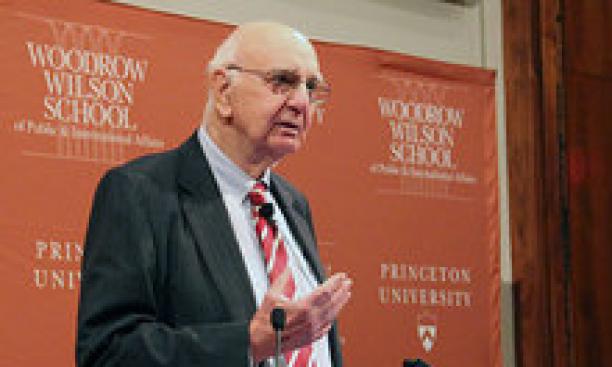
Public institutions must regain the confidence of the American people, Paul A. Volcker ’49, former chair of the Federal Reserve, said in a lecture in Robertson Hall on Feb. 7.
“I’ve never doubted the importance of our public institutions or the need for constant vigilance by our public leaders, by regulation institutions, and by our citizens generally. Today you can sense that those central propositions are questioned,” Volcker said.

Paul A. Volcker '49 (Photo: Ellis Liang '15)
With his dry humor, Volcker elicited laughs from the audience even as he critiqued public administration and how universities educate future civil servants. He confessed that he had shied away from making speaking appearances but could not resist an invitation from his alma mater to speak about good governance.
“In that context, my speech can be both definitive and exceedingly short. The current state of our governing bodies is poor. Quite simply, they are not meeting the needs of our citizens. Are there questions?” Volcker said, jokingly.
Transitioning into a more serious tone, Volcker pointed out that while a certain amount of skepticism is an integral part of our government, what was once healthy skepticism has turned into corrosive distrust.
“No democracy — no government of the people, by the people, for the people, in Abraham Lincoln’s stirring words — can flourish or exist if the people themselves have lost confidence in the governing processes,” he said.
Volcker suggested that one way to reestablish faith in government is to produce better administrators. Though the Woodrow Wilson School succeeds in exploring interesting questions about economics, international relations, and policy, Volcker believes that students should learn more practical knowledge.
“How much is being paid to how to get something done, to practically implement good ideas, to achieve a degree of efficiency in the provision of necessary public services? Because without a sense of good and fair public management, how could we expect to restore trust?” he asked.
According to Volcker, an emeritus professor at the Wilson School, Princeton can start rethinking approaches to an education in public service by facilitating public sector internships. He supported the idea that the in-the-field education gained through an internship can serve as an add-on or a substitute to regular classroom education. At the very least, the Wilson School should include in its policy classes lessons on how to practically implement those policies.
“The whole field of public policy and public administration needs rejuvenation. The success will come down to the willingness of leading schools to participate in the act,” Volcker said. “Princeton in the nation’s service cannot be more relevant than today, and it’s in my mind that the Woodrow Wilson School should be the proud, concrete manifestation of that commitment.”
In an effort to answer this question, Volcker started the Volcker Alliance last year. The organization brings together educational institutions, businesses, governmental institutions, and public interest groups to research and implement policies for effective governance.
